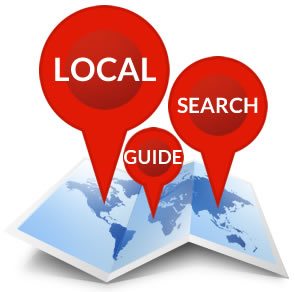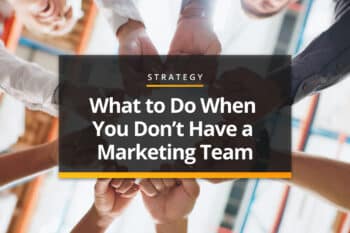
Like the primary onsite strategies recommended in phase 2 of our Massive Guide to Local Search Tactics, there are many things that you can control offsite in your SEO campaign. Even though these tactics are not accomplished with your own website, you have absolute control to do as much or as little as you want with them. Dive in with Google+ and continue to build on your previous efforts using the following tactics.
Setup Google Places/Google+
Local on Google starts with establishing your business listing on Google Places and/or Google+.
You should establish an account for your business and optimize it to the hilt immediately. Having an account allows you to control your company information online, engage with potential customers and increase your visibility.
But, what’s the difference between Google Places and Google+? The answer is not so simple…
Google Places: When Google began to focus on “local” and populating accurate business data on their maps product, they offered a way for businesses to establish an account, populate and optimize that data. You can still establish a Google Places account. Google may already have your business information listed but having a Google Places account allows you to control the data and expand it. (Now technically called Google Places for Business)
Google+: Google+ is the social arm of Google Local online. (Think of it as Google’s answer to Facebook.) Eventually Places will be combined with Google+ as one product. You can opt to establish a Google+ account for your business. If you decide to go this route you do not need to establish a Google Places account. Eventually all accounts will be merged as Google+. (Now technically called Google+ Business)
To confirm, this is all confusing and it keeps changing.
Basically what you need to do (at the time of this writing) is the following:
- EXISTING PLACES ACCOUNT: If you have a Google Places for Business page, keep it, optimize it, monitor it. Wait for the Google+ merge. You can merge this manually if you want to engage more socially.
- EXISTING GOOGLE+ ACCOUNT: The word is that eventually all Places accounts will be officially migrated to Google + Business accounts so you should probably just stick with your Google+ Business account and not establish a Places account. That way you’ll have one central account.
- NEW BUSINESS LISTING: If you are setting up a new business listing you could technically go either way or both. But if we’re looking for a definitive answer I’d say that you should stick with Mike Blumenthal’s advice and start with a Google Places for Business account and upgrade it later.
More Reading:
Google Places/Google+ Explained
Google Places for Business vs. Google+ Local
Getting started with Google Places for Business
Setup Bing Places
Setup of a Bing Places account is easy. Establish your account, follow the instructions to optimize it and move on. The Bing search engine powers Yahoo.com search results so it’s a “must do” step in a successful local seo plan.
More information:
10 Basic Bing Local Optimization Tips
Setup Yahoo Local (Localworks)
Yahoo Local listings are not as complicated as Google but they do have options. At the base level you need to sign up for a free basic listing.
At the time of this writing they did have several other paid options including a directory submission level powered by Yext. The value of paying for the Yext service is debatable and not something that we’ll address here at the moment. But increasing your citations is important as we’ll discuss later.
Submit to Primary Data Distributors
Have you ever wondered how Google Maps or your GPS have information about your business? Many times they get their information from secondary data distributors.
You can go directly to these sites and have them distribute your information to hundreds of websites and services.
As of 2014 here are the top companies. We won’t go into the specifics here because things are always changing.
More information:
Keep an eye on David Mihm over at Moz.com as he continually updates us on the ever changing world of how these companies distribute data to sites and search engines.
Need help with your data distribution? Look no further.
Claim Industry Specific Citations
Citations are listings of your business on other websites. The basic information is Name, Address and Phone (Your NAP). More information can be distributed and uploaded to other websites including your website address, photos, videos and more.
Industry specific citations are important because they help search engines understand what your business does. The more citations that you have, the more Google will trust that you’re a legit business operating in your field.
We’re a local SEO company so it makes sense for us to be listed on various SEO directory sites, marketing industry directories, etc.
Industry specific citations can be either structured or unstructured citations. The difference is that structured citations are usually in a directory or searchable/sortable format that search engines and users can easily digest. Unstructured citations are a little more random where you might be the only business listed on the page. Structured citations are obviously much harder to establish but can be very valuable to your local SEO efforts.
Your industry citation targets will be completely different than the next guy but there are resources available to get you started with the basics.
More Information:
Best Industry Citations from GetListed.org
Looking for an easy way to find citations? Look no further.
Claim Local Citations
Local citations are listings of your business on other websites in your local area. The basic information is Name, Address and Phone (Your NAP). More information can be distributed and uploaded to other websites including your website address, photos, videos and more.
Local specific citations are important because they help search engines understand where your business in located and what you do (among other things). The more citations that you have, the more Google will trust that you’re a legit business operating in your local area.
We’re a local internet marketing company located in Ohio so it makes sense for us to be listed on any business directory that’s specific to Ohio or cities in our local area.
More Information:
Best sources for local citations.
Looking for an easy way to find citations? Look no further.
Claim Listings on Priority Citation/Directory Sites
Citations are listings of your business on other websites. The basic information is Name, Address and Phone (Your NAP). More information can be distributed and uploaded to other websites including your website address, photos, videos and more.
Citations are important because they help search engines learn more about your business. The more citations that you have, the more Google will trust that you’re a legit business.
Be careful about submitting your information to just any site. It won’t necessarily hurt anything, just consider the time that it takes because not all sites are created equal. Start with obvious choices like popular Yellow Page websites, Yelp.com, etc.
NOTE: Data distributors will send your information to most popular sites but they might only be sending basic information. To fully optimize your listings you’ll need to manually claim and optimize them.
More Information:
Looking for an easy way to find citations? Look no further.
Bright Local’s Top 50 Local Citation Sites
The Massive Guide to Local Search Tactics
Phase 1: Local Campaign Planning & Setup
Phase 2: Primary Onsite Local Strategies
Phase 3: Primary Offsite Local Strategies
Phase 4: Secondary Onsite Local Strategies
Most Popular Articles

Seeing Favicons in Your Google Search Results? Here’s Why…
Have you noticed anything different in your Google Search results lately? Google added tiny favicon icons to its organic search results in January. It was…

Business Growth and Digital Marketing News & Tips 11-17-24
Are you encouraging and rewarding innovation? Lee Cockerell is the former Executive Vice President of Operations at Walt Disney World. A lover of traditional red…

Business Growth and Digital Marketing News & Tips 11-27-24
A culture of gratitude "Feeling gratitude and not expressing it is like wrapping a present and not giving it." – William Arthur Ward Beyond being…








